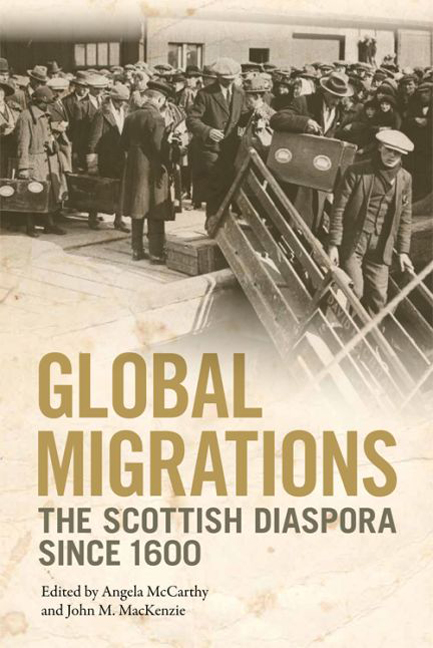Book contents
- Frontmatter
- Contents
- List of Figures and Tables
- Notes on the Contributors
- Acknowledgements
- A Tribute to Sir Tom Devine
- 1 Introduction-Global Migrations: The Scottish Diaspora since 1600
- 2 ‘As Hewers of Wood, and Drawers of Water’: Scotland as an Emigrant Nation, c. 1600 to c. 1800
- 3 ‘You Have Only Seen the Fortunate Few and Draw Your Conclusion Accordingly’: Behavioural Economics and the Paradox of Scottish Emigration
- 4 Scottish Diasporas and Africa
- 5 ‘Have the Scotch no Claim upon the Cherokee?’ Scots, Indians and Scots Indians in the American South
- 6 Conflicts of Interest, Crises of Conscience: Scots and Aboriginal People in Eastern Australia, 1830s–1861
- 7 The Importance of Scottish Origins in the Nineteenth Century: James Taylor and Ceylon Tea
- 8 ‘Our Old World Diff'rences are Dead’: The Scottish Migrant Military Tradition in the British Dominions during the First World War
- 9 ‘Part of my Heritage’: Ladies’ Pipe Bands, Associational Culture and ‘Homeland’ Identities in the Scottish Diaspora
- 10 Understanding Scottishness among Sojourners, Settlers and Descendants in Hong Kong and New Zealand
- 11 Encountering an Imaginary Heritage: Roots Tourism and the Scottish Diaspora
- 12 Home is where the Heart is: Affinity Scots in the Scottish Diaspora
- 13 What Scottish Diaspora?
- 14 Afterword
- Index
13 - What Scottish Diaspora?
Published online by Cambridge University Press: 23 September 2017
- Frontmatter
- Contents
- List of Figures and Tables
- Notes on the Contributors
- Acknowledgements
- A Tribute to Sir Tom Devine
- 1 Introduction-Global Migrations: The Scottish Diaspora since 1600
- 2 ‘As Hewers of Wood, and Drawers of Water’: Scotland as an Emigrant Nation, c. 1600 to c. 1800
- 3 ‘You Have Only Seen the Fortunate Few and Draw Your Conclusion Accordingly’: Behavioural Economics and the Paradox of Scottish Emigration
- 4 Scottish Diasporas and Africa
- 5 ‘Have the Scotch no Claim upon the Cherokee?’ Scots, Indians and Scots Indians in the American South
- 6 Conflicts of Interest, Crises of Conscience: Scots and Aboriginal People in Eastern Australia, 1830s–1861
- 7 The Importance of Scottish Origins in the Nineteenth Century: James Taylor and Ceylon Tea
- 8 ‘Our Old World Diff'rences are Dead’: The Scottish Migrant Military Tradition in the British Dominions during the First World War
- 9 ‘Part of my Heritage’: Ladies’ Pipe Bands, Associational Culture and ‘Homeland’ Identities in the Scottish Diaspora
- 10 Understanding Scottishness among Sojourners, Settlers and Descendants in Hong Kong and New Zealand
- 11 Encountering an Imaginary Heritage: Roots Tourism and the Scottish Diaspora
- 12 Home is where the Heart is: Affinity Scots in the Scottish Diaspora
- 13 What Scottish Diaspora?
- 14 Afterword
- Index
Summary
FOR EVERY HISTORIAN OF human migration, there surely comes a moment of suspicion that one has been asking the wrong question. Instead of asking why so many people have moved so far, why not ask why so many have failed to do so? Is long-distance migration a perplexing abnormality, or a normal and recurring element of human behaviour? Most studies, whether economic, sociological or psychological, still treat long-distance movement as a disruptive aberration or ‘haemorrhage’, reflecting structural inadequacies in the home environment or deliberate discrimination against sub-groups within societies or families. The eruption of mass migration is most easily envisaged as a product of catastrophes such as war or famine, or else as a baneful consequence of agrarian or industrial restructuring. Even economic historians, for whom fluctuations in migration are typically explained as rational responses to differential employment opportunities, tend to deplore the regional disparities that forced tens of millions of Europeans to expand the range of rational action beyond home boundaries. Though the outcome of mass migration may be to accelerate globalisation and economic convergence, most economists would still prefer this to be pursued through movements of capital and information rather than labour. While rational, ‘enterprising’ responses to pull factors are widely admired, similar responses to push factors are treated as regrettable, sometimes tragic consequences of political or managerial failure (a form of ‘exile’).
Yet, for each individual, movement almost always offers the prospect of a better job, a more congenial environment, a happier life somewhere else, whether across the road, the country or the ocean. However good life is, it might be even better elsewhere. From this viewpoint, the central issue for the historian of diaspora is to explain the nature and force of inhibiting factors such as transportation, funding, familial and social ties, aversion to physical or moral risk and fear of isolation. If everyone, or almost everyone, is migratory by disposition, then everyone is more or less motivated by impulses such as a sense of adventure, a desire to grasp novel opportunities and a sense of confinement at home. In pursuing these impulses, whether within the homeland or beyond, migrants will attempt to acquire essential skills such as canniness, enterprise, sensitivity to alien environments, adaptability and versatility. These reputedly quintessential ‘Scottish’ virtues are no less applicable to Irish migrants, emerging from a very different home culture, and indeed to humanity in general.
- Type
- Chapter
- Information
- Global MigrationsThe Scottish Diaspora since 1600, pp. 240 - 271Publisher: Edinburgh University PressPrint publication year: 2016

